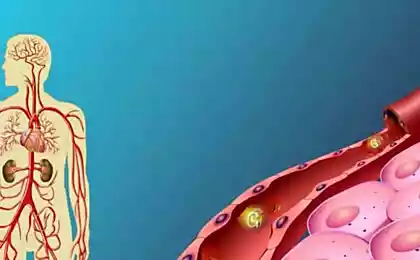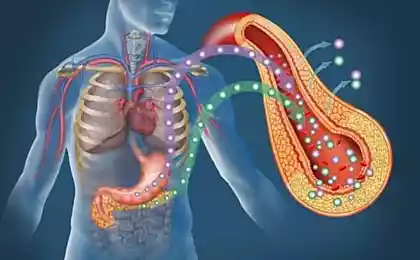444
Psychosomatics diabetes
It is believed that the disease name "diabetes" was introduced into medicine by the Roman physician Areteus (II century BC). He described the symptoms and course of the disease: "Diabetes is terrible, it dissolves the flesh and limbs. Patients continually drink and emit water in a continuous flow. Their lives are short and painful, thirst unquenchable".
Diabetes in Greek means the expiry of, respectively, diabetes means the loss of body sugar. In the days when he lived Areteus, disease was diagnosed by their appearance, and treatment determined by patient's age and the severity of the disease. So, if diabetes was a sick child (usually the first type of diabetes, insulin dependent), the disease proceeded rapidly and was not subject to treatment – the patient was doomed. If an adult came down with type II diabetes (insulin), he was given treatment, which mostly consisted of diet, exercise and herbal medicine (tonic and immune-boosting herbal tea).
Five million two hundred eighteen thousand two hundred forty six
And in modern medicine remains, in most cases, diabetes is symptomatic, that is, the treatment is addressing the symptoms, not the causes. Therefore, the main objectives are stabilization of carbohydrate metabolism, minimization of complications, normalization of the patient's weight and, finally, teaching the patient how to live with diabetes – monitor blood sugar levels, to understand the importance of proper nutrition, knowing what to do when signs of hypoglycemia, etc.
But a symptomatic approach to the treatment of diabetes – not only in modern medicine. Psychosomatic approach is to look at the problem of the disease differently. Based on the concept of the unity of the physical and the mental in man, psychosomatic medicine investigated the relationship of psychological characteristics of a person with diabetes and their mental disorders. Based on the studies, it was concluded that the following conditions can contribute to the development of diabetes.
Forewarned is forearmed. Psychosomatic approach allows to reveal the human tendency to a particular disease and take the necessary preventive measures. Here, as for symptomatic treatment, the important role played by patient education. The patient should be aware of the risk and must understand that his health does not only depend on skilled medical care, but also from himself. Along with diet, exercise and medicines necessary to work with the psychological issues that contribute to the development of the disease. Modern medical science is still talking about the importance of an integrated approach to human health.published
Author: Yulia Ustinova
P. S. And remember, just changing your mind — together we change the world! ©
Source: www.ustinova.info/psihosomatika-saharnogo-diabeta/
Diabetes in Greek means the expiry of, respectively, diabetes means the loss of body sugar. In the days when he lived Areteus, disease was diagnosed by their appearance, and treatment determined by patient's age and the severity of the disease. So, if diabetes was a sick child (usually the first type of diabetes, insulin dependent), the disease proceeded rapidly and was not subject to treatment – the patient was doomed. If an adult came down with type II diabetes (insulin), he was given treatment, which mostly consisted of diet, exercise and herbal medicine (tonic and immune-boosting herbal tea).
Five million two hundred eighteen thousand two hundred forty six
And in modern medicine remains, in most cases, diabetes is symptomatic, that is, the treatment is addressing the symptoms, not the causes. Therefore, the main objectives are stabilization of carbohydrate metabolism, minimization of complications, normalization of the patient's weight and, finally, teaching the patient how to live with diabetes – monitor blood sugar levels, to understand the importance of proper nutrition, knowing what to do when signs of hypoglycemia, etc.
But a symptomatic approach to the treatment of diabetes – not only in modern medicine. Psychosomatic approach is to look at the problem of the disease differently. Based on the concept of the unity of the physical and the mental in man, psychosomatic medicine investigated the relationship of psychological characteristics of a person with diabetes and their mental disorders. Based on the studies, it was concluded that the following conditions can contribute to the development of diabetes.
- Post-traumatic depression, which can develop after some heavy shocks: the loss of loved ones, rape, forced separation from a loved one. In such cases, the body is "stuck" in a state of stress and cannot get out of it, even when the situation is rooted in the past. The endocrine system works at maximum capacity, and may begin to suffer thyroid gland, adrenal gland or pancreas.
- Unresolved issues in the family that people can hide over the years, afraid to correct them radically. It can be alcoholism or infidelity of a spouse, when out of a desire to save the marriage, women suffer unbearable conditions of existence in the family. On the condition of the pancreas especially bad feeling of waiting for the collapse, the expectation that everything will end badly.
- Increased anxiety can also trigger the development of diabetes, as in a state of anxiety the human body faster burns sugar and insulin fails to produce in the right quantity. That is why a lot of people to cope with anxiety, so much you want sweet. So, over time, can form the constant need to stress-eating chocolates and cakes. The result is a psychological dependence on sweets, impaired regulation of insulin and development of type II diabetes.
Forewarned is forearmed. Psychosomatic approach allows to reveal the human tendency to a particular disease and take the necessary preventive measures. Here, as for symptomatic treatment, the important role played by patient education. The patient should be aware of the risk and must understand that his health does not only depend on skilled medical care, but also from himself. Along with diet, exercise and medicines necessary to work with the psychological issues that contribute to the development of the disease. Modern medical science is still talking about the importance of an integrated approach to human health.published
Author: Yulia Ustinova
P. S. And remember, just changing your mind — together we change the world! ©
Source: www.ustinova.info/psihosomatika-saharnogo-diabeta/























